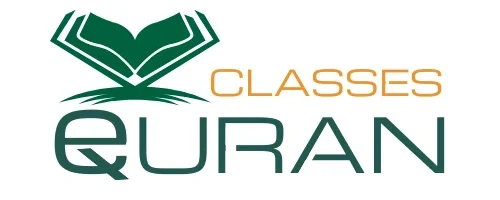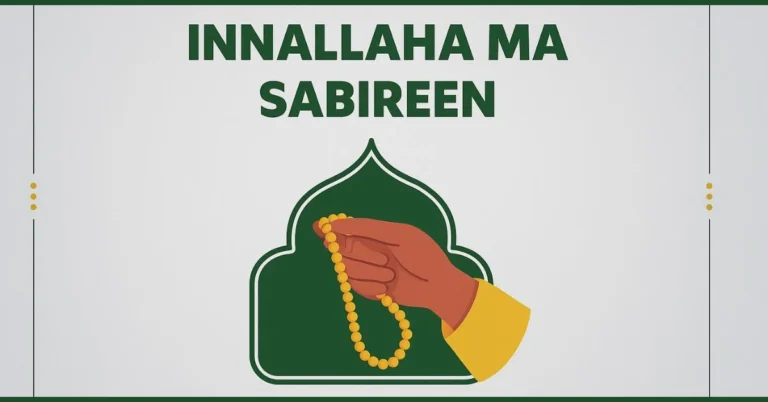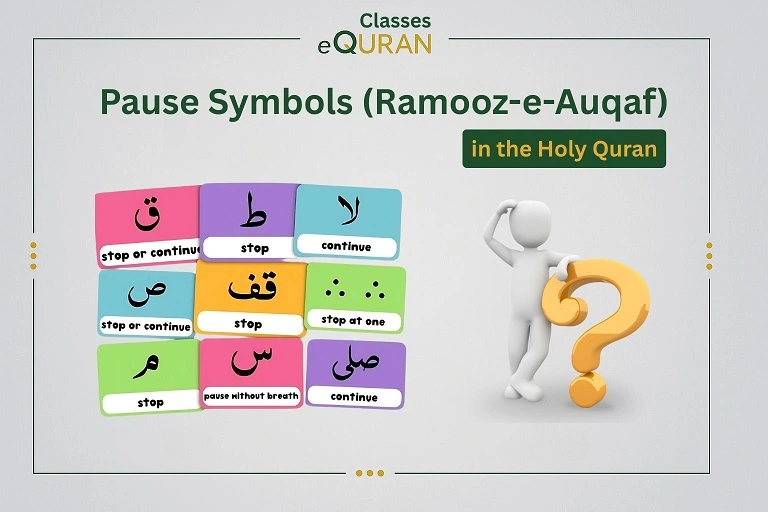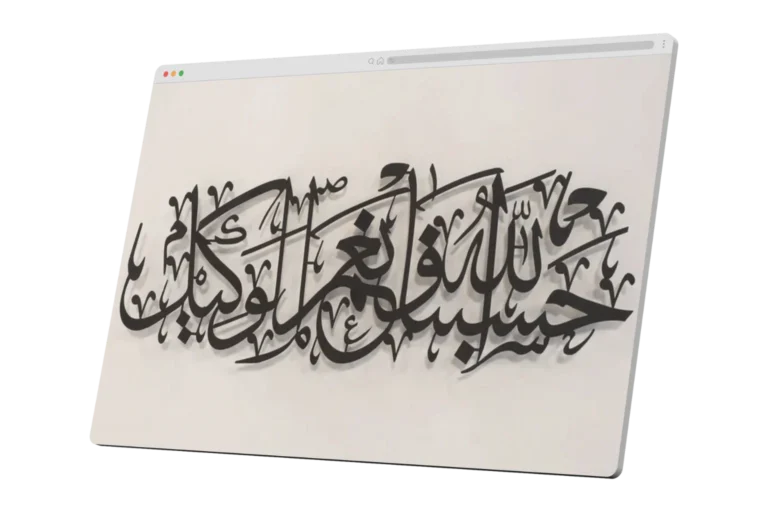Allahumma Barik (اللهم بارك) Meaning: When to Say It & How to Reply
Allahumma Barik, a cherished Islamic dua, means “O Allah, bless.” Muslims say it to seek blessings. It brings spiritual growth and protects from harm. In our online Quran classes, students learn this dua to celebrate progress. Families, reverts, and women find it easy to use. Rooted in the Sunnah, it fosters gratitude and strengthens community bonds. Join us to explore its meaning, usage, and replies, perfect for your spiritual journey.
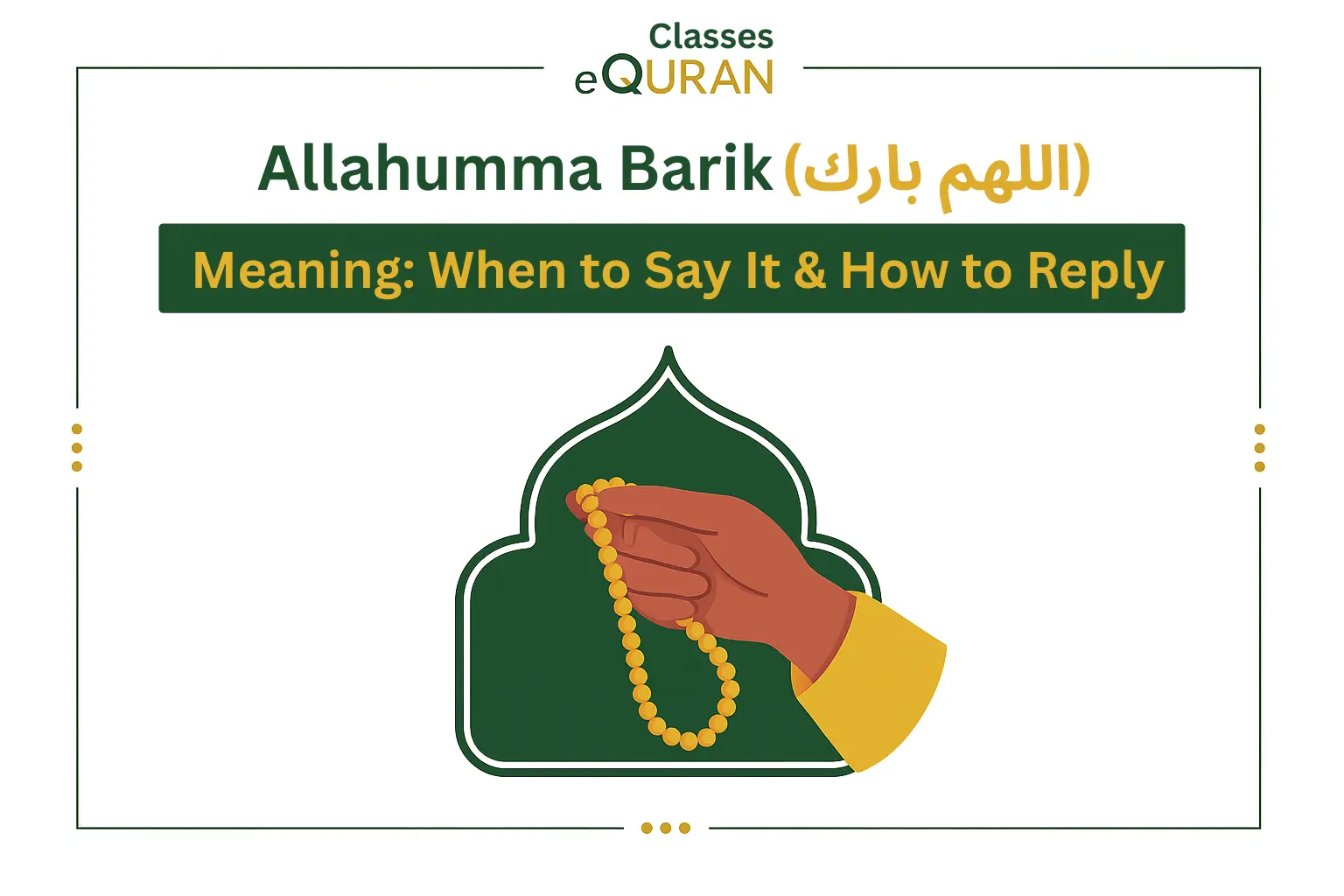
What Does “Allahumma Barik” Mean?
Allahumma Barik means “O Allah, bless” or “May Allah bless you.” It’s a heartfelt dua for blessings. The phrase combines “Allāhumma” (O Allah) and “Barakah” (blessings). “Allāhumma” (ٱللَّٰهُمَّ) addresses Allah directly, seeking His favor. Some scholars, like Sibawayh, say “Allāhumma” shortens “Yā Allah” with “-mma” for emphasis. Others suggest Hebrew or Qahṭāni roots, adding historical depth. In Arabic, it’s written as اللهم بارك and transliterated as Allahumma Barik. This dua invites divine goodness for people or things.
How to Pronounce Allahumma Barik
Pronouncing Allahumma Barik is simple with practice. Say it as “Al-laa-hum-ma Baa-rik.” Our online Quran classes offer audio guides to perfect your recitation. Non-Arabic speakers, like reverts, start slowly. Practice daily with a Quran teacher. Record yourself to check progress. Avoid rushing; focus on clear sounds.
Variations of Allahumma Barik for Men, Women, and Groups
Allahumma Barik changes based on who or what you address. Here are the variations:
| Subject | Arabic Phrase | Transliteration | Meaning |
|---|---|---|---|
| Single Male | اللّهُـمَّ بارِكْ لَه | Allahumma Barik Lahu | O Allah, bless him |
| Single Female | اللّهُـمَّ بارِكْ لَها | Allahumma Barik Laha | O Allah, bless her |
| Group (Males/Mixed) | اللّهُـمَّ بارِكْ لَهُم | Allahumma Barik Lahum | O Allah, bless them |
| Group (Females) | اللّهُـمَّ بارِكْ لَهُنَّ | Allahumma Barik Lahun | O Allah, bless them |
| Object | بارك الله لك فيها | Barakallahu Laka Fiha | May Allah bless it for you |
Arabic grammar uses gender and number. “Lahu” is for one male, “Laha” for one female. “Lahum” suits males or mixed groups, while “Lahun” is for female groups. “Fiha” refers to objects. Beginners practice these in our online Quran classes. They’re simple and build confidence.
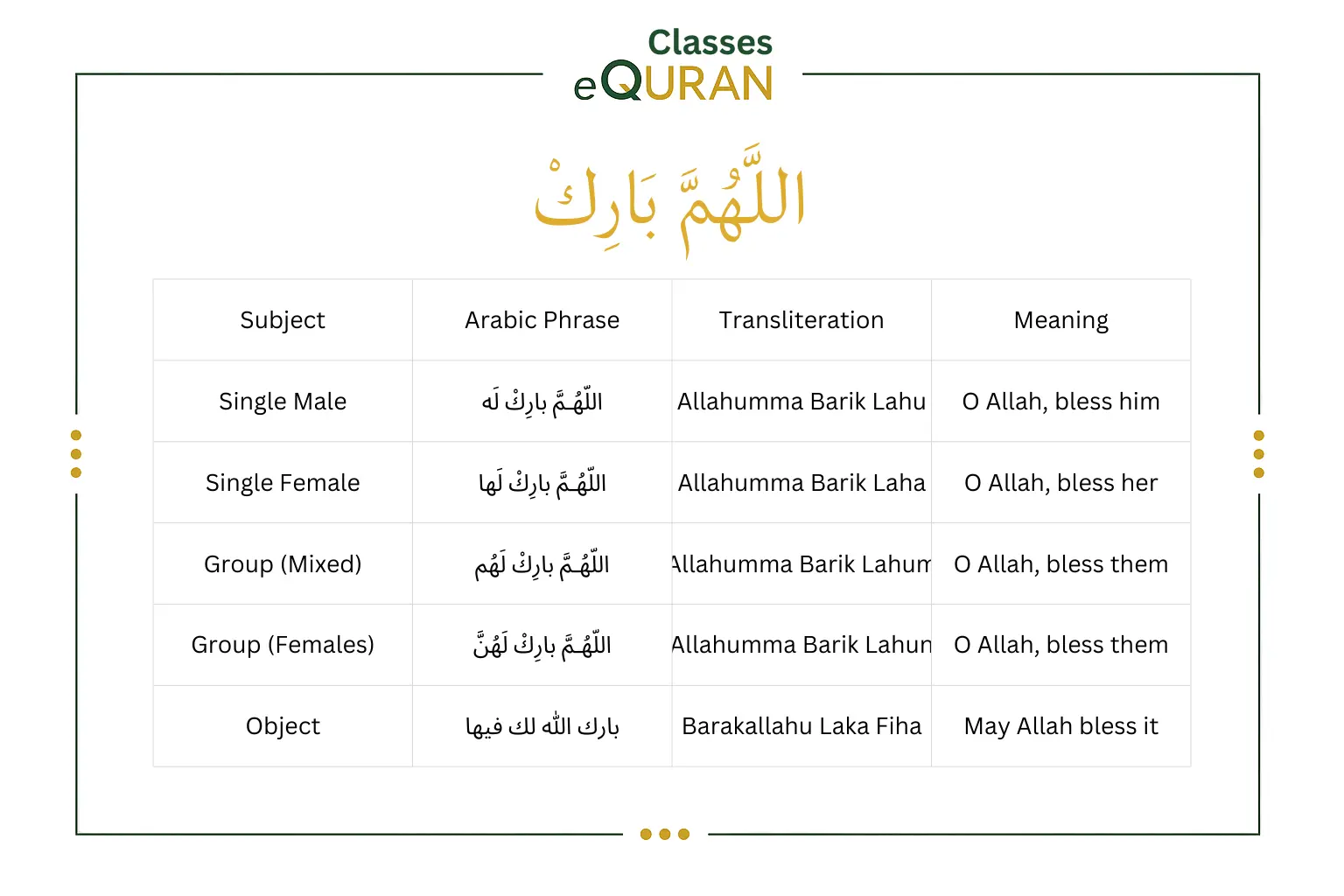
When to Say Allahumma Barik
Say Allahumma Barik to share blessings in meaningful moments. Here’s when to use it:
| Situation | Purpose | Example Phrase |
|---|---|---|
| Expressing Gratitude | Thank someone for a kind gesture or gift | Thanks for the book, Allahumma Barik! |
| Congratulating Achievements | Celebrate milestones and successes | Congrats on your degree! Allahumma Barik! |
| Admiring Beauty or Possessions | Protect from the evil eye while admiring something | Your new car looks amazing, Allahumma Barik! |
| Special Occasions | Bless major life events like weddings or births | Allahumma Barik on your new baby! |
| In Online Quran Classes | Encourage and bless students’ progress | You learned Al-Fatiha! Allahumma Barik! |
This dua spreads positivity and blessings. Use it sincerely to honor Allah’s gifts. Our Quran classes teach its perfect timing.
How to Use Allahumma Barik in Daily Life
Use Allahumma Barik to spread blessings every day. Here are real-life ways to say it:
- Helping a Neighbor: Your neighbor shares food. Say, “This dish is delicious, Allahumma Barik!”
- Praising a Child’s Recitation: Your child recites a Surah. Say, “Beautiful recitation, Allahumma Barik!”
- Commenting on Social Media: A friend posts a wedding photo. Comment, “So happy for you, Allahumma Barik!”
In our online Quran classes, teachers use it to celebrate progress. Example: “You memorized Al-Ikhlas, Allahumma Barik!” Students feel encouraged. Urdu-speaking Muslims say it similarly, often with “Mashallah.” Arabs may add “Lahu” for males. Use it sincerely to share joy. Practice it daily to strengthen faith.
How to Reply to Allahumma Barik
When someone says “Allahumma Barik,” respond with gratitude. Here are common replies:
| Reply | Arabic | Meaning | Notes |
|---|---|---|---|
| Ameen | آمين | May it be so | Simple, sincere response; great for children to learn |
| Barakallahu Feek | بارك الله فيك | May Allah bless you too | Polite and kind way to return the blessing |
| Ameen wa Iyaak (male) / Iyaaki (female) | آمين وإياك / آمين وإياكِ | Ameen, and to you too | Gender-specific; used to return the blessing personally |
| Jazakallah Khair | جزاك الله خيرًا | May Allah reward you with goodness | Expresses gratitude while returning the kindness |
Reply with humility to reflect Islamic values. Stay sincere, not showy. Smile to show warmth. For kids, teach “Ameen.” It’s easy and builds confidence. In our online Quran classes, children practice these replies. They learn to share blessings joyfully.
Religious Significance of Allahumma Barik
Allahumma Barik holds deep meaning in Islam. It’s a Sunnah dua for blessings and protection. The Prophet (PBUH) used it often. In Sunan Ibn Majah 1906, he said, “ اللَّهُمَّ بَارِكْ لَهُمْ وَبَارِكْ عَلَيْهِمْ“Allahumma Barik Lahum wa Barik Alaihim” at Aqil bin Abu Talib’s marriage. This seeks blessings for the couple. In Sunan Abi Dawud 3730, he taught it for food or milk. It invites Allah’s favor. Saying Allāhumma Barik protects from the evil eye. Angels respond with “Ameen,” boosting their spiritual power. This dua strengthens faith and community. Our online Quran classes teach its sacred use.
Benefits of Saying Allahumma Barik
Saying Allahumma Barik brings powerful blessings. Here are its key benefits:
Allahumma Barik vs. Mashallah: What’s the Difference?
Allahumma Barik and Mashallah sound similar but have distinct roles.
Cultural Variations in Using Allahumma Barik
Muslim communities worldwide cherish Allāhumma Barik, but usage varies.
- South Asian Muslims: Urdu-speaking families often say it with “Mashallah.” Example: “Mashallah, beautiful dress! Allahumma Barik!”
- Middle Eastern Muslims: Arabs emphasize Tajweed, using “Lahu” or “Laha” for precision. Example: Allahumma Barik Laha” for a bride.
- Western Muslims: English-speaking communities use it casually. Example: “Got a promotion? Allahumma Barik!”
Reverts find it simple to learn. Say it to bless others, no complex rules. In our online Quran classes, we teach its universal appeal. This dua unites diverse Muslims, spreading blessings.
Common Mistakes to Avoid
Using Allahumma Barik correctly honors its sacred meaning. Avoid these common errors:
- Mispronouncing the Phrase: Skipping Tajweed distorts Allāhumma Barik. Say “Al-laa-hum-ma Baa-rik” clearly. Practice with our online Quran classes.
- Using It Insincerely: Don’t say it without meaning. Be genuine when blessing others. Example: Only say it to truly wish well.
- Forgetting to Respond: Ignoring the dua seems rude. Reply with “Ameen” or “Barakallahu Feek” to show gratitude.
Stay mindful to respect this dua’s purpose. Our classes help kids and reverts use it properly.
Frequently Asked Questions
Here are answers to common questions about Allahumma Barik, clear and simple for all learners:
